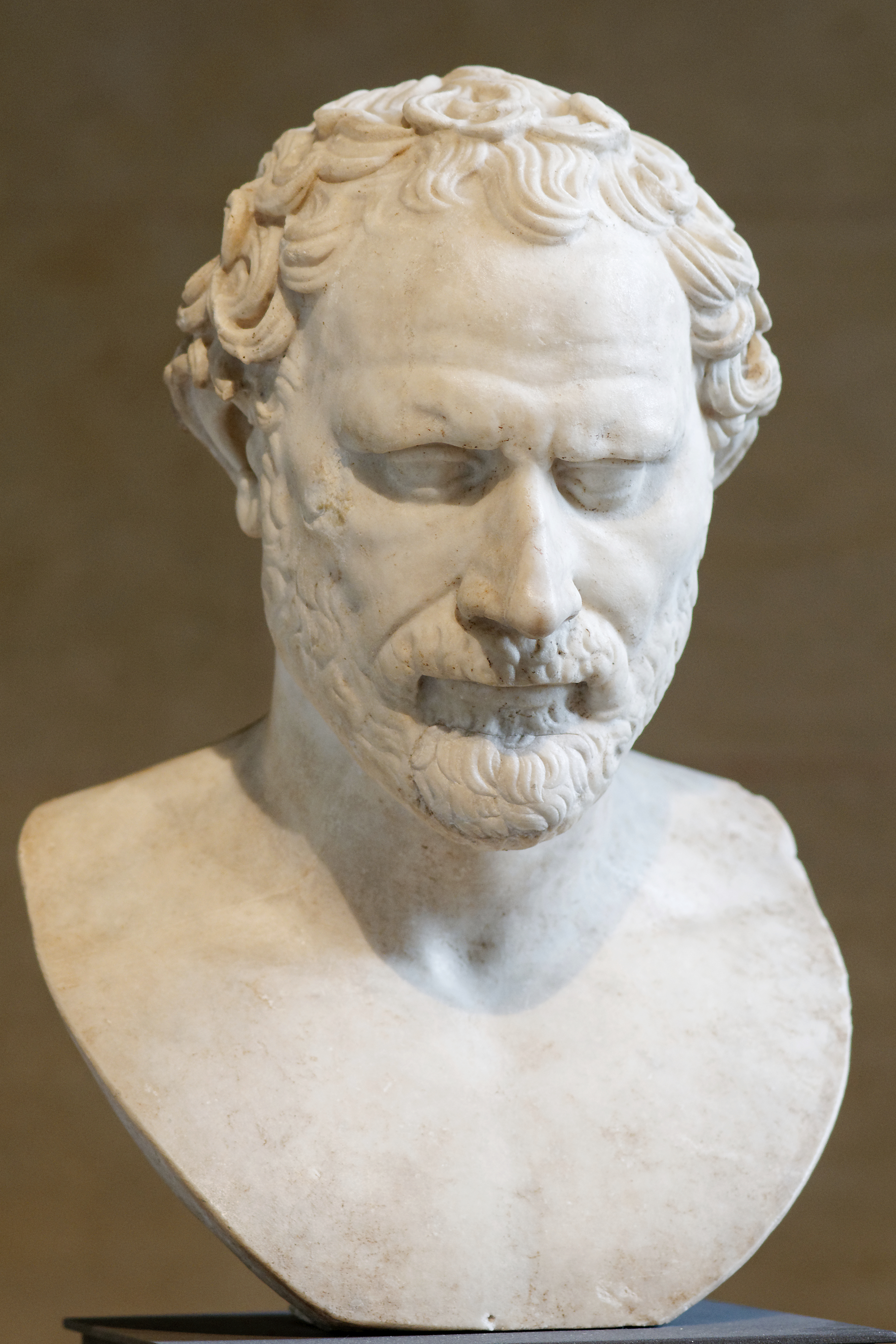
Demosthenes
Demosthenes (/dɪˈmɒs.θəniːz/; Greek: Δημοσθένης, romanized: Dēmosthénēs; Attic Greek: [dɛːmostʰénɛːs]; 384 – 12 October 322 BC) was a Greek statesman and orator in ancient Athens. His orations constitute a significant expression of contemporary Athenian intellectual prowess and provide insight into the politics and culture of ancient Greece during the 4th century BC. Demosthenes learned rhetoric by studying the speeches of previous great orators. He delivered his first judicial speeches at the age of 20, in which he successfully argued that he should gain from his guardians what was left of his inheritance. For a time, Demosthenes made his living as a professional speechwriter (logographer) and a lawyer, writing speeches for use in private legal suits.
For other historical and fictional personages named Demosthenes, see Demosthenes (disambiguation).
Demosthenes
Demosthenes grew interested in politics during his time as a logographer, and in 354 BC he gave his first public political speeches. He went on to devote his most productive years to opposing Macedon's expansion. He idealized his city and strove throughout his life to restore Athens' supremacy and motivate his compatriots against Philip II of Macedon. He sought to preserve his city's freedom and to establish an alliance against Macedon, in an unsuccessful attempt to impede Philip's plans to expand his influence southward, conquering the Greek states.
After Philip's death, Demosthenes played a leading part in his city's uprising against the new king of Macedonia, Alexander the Great. However, his efforts failed, and the revolt was met with a harsh Macedonian reaction. To prevent a similar revolt against his own rule, Alexander's successor in this region, Antipater, sent his men to track Demosthenes down. Demosthenes killed himself to avoid being arrested by Archias of Thurii, Antipater's confidant.
The Alexandrian Canon, compiled by Aristophanes of Byzantium and Aristarchus of Samothrace, called Demosthenes one of the ten greatest Attic orators and logographers. Longinus likened Demosthenes to a blazing thunderbolt and argued that he had "perfected to the utmost the tone of lofty speech, living passions, copiousness, readiness, speed."[2] Quintilian extolled him as lex orandi ("the standard of oratory"). Cicero said of him that inter omnis unus excellat ("one exceeds among all"), and also praised him as "the perfect orator" who lacked nothing.[3]
Assessments[edit]
Political career[edit]
Plutarch lauds Demosthenes for not being of a fickle disposition. Rebutting historian Theopompus, the biographer insists that for "the same party and post in politics which he held from the beginning, to these he kept constant to the end; and was so far from leaving them while he lived, that he chose rather to forsake his life than his purpose".[120] On the other hand, Polybius, a Greek historian of the Mediterranean world, was highly critical of Demosthenes' policies. Polybius accused him of having launched unjustified verbal attacks on great men of other cities, branding them unjustly as traitors to the Greeks. The historian maintains that Demosthenes measured everything by the interests of his own city, imagining that all the Greeks ought to have their eyes fixed upon Athens. According to Polybius, the only thing the Athenians eventually got by their opposition to Philip was the defeat at Chaeronea. "And had it not been for the King's magnanimity and regard for his own reputation, their misfortunes would have gone even further, thanks to the policy of Demosthenes".[121]
The "publication" and distribution of prose texts was common practice in Athens by the latter half of the fourth century BC and Demosthenes was among the Athenian politicians who set the trend, publishing many or even all of his orations.[159] After his death, texts of his speeches survived in Athens (possibly forming part of the library of Cicero's friend, Atticus, though their fate is otherwise unknown), and in the Library of Alexandria.[160]
The Alexandrian texts were incorporated into the body of classical Greek literature that was preserved, catalogued and studied by the scholars of the Hellenistic period. From then until the fourth century AD, copies of Demosthenes' orations multiplied and they were in a relatively good position to survive the tense period from the sixth until the ninth century AD.[161] In the end, sixty-one orations attributed to Demosthenes survived till the present day (some however are pseudonymous). Friedrich Blass, a German classical scholar, believes that nine more speeches were recorded by the orator, but they are not extant.[162] Modern editions of these speeches are based on four manuscripts of the tenth and eleventh centuries AD.[163]
Some of the speeches that comprise the "Demosthenic corpus" are known to have been written by other authors, though scholars differ over which speeches these are.[m] Irrespective of their status, the speeches attributed to Demosthenes are often grouped in three genres first defined by Aristotle:[164]
In addition to the speeches, there are fifty-six prologues (openings of speeches). They were collected for the Library of Alexandria by Callimachus, who believed them genuine.[167] Modern scholars are divided: some reject them, while others, such as Blass, believe they are authentic.[168] Finally, six letters also survive under Demosthenes' name and their authorship too is hotly debated.[n]
Later honours[edit]
The Demosthenian Literary Society, founded in 1803 at the University of Georgia, was named in honor of Demosthenes.[169] In 1936, an American botanist Albert Charles Smith named a genus of shrubs in the family Ericaceae, which were native to south America,[170] as Demosthenesia in honour of Demosthenes.[171]